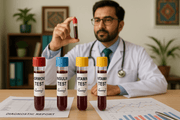
Blood Tests Every Woman with PCOS Should Know About
If you or a loved one have been told you might have PCOS or are struggling with its symptoms, you’re not alone—millions of Pakistani women are facing the same journey. Understanding your health and gaining clarity through the right blood tests can help you feel empowered, in charge, and hopeful for a healthier tomorrow. Let’s explore why these tests matter and how they can change the way PCOS affects your life.
Understanding PCOS: The Basics Every Pakistani Woman Should Know
Polycystic Ovary Syndrome — commonly known as PCOS — is a hormonal disorder affecting women of reproductive age. If you’re wondering about PCOS full form or what the first signs of PCOS are, you’re not alone; questions like “what are female PCOS symptoms?”, “how does PCOS affect life?”, and “can people with PCOS get pregnant?” are common among Pakistani women, married and unmarried alike.
Common symptoms include:
- Irregular periods or missed cycles
- Unwanted facial or body hair growth
- Acne and skin problems
- Weight gain or difficulty losing weight
- Thinning hair or hair loss
- Fertility challenges
Spotting the first signs of PCOS early can pave the way for timely intervention and management. But what causes PCOS? While the exact cause remains unknown, factors like insulin resistance, hormonal imbalance, inflammation, and genetics play significant roles.
Why Blood Tests Are Essential for PCOS Diagnosis and Management
If you’ve searched for how to cure PCOS permanently, know that while there isn’t a “one-pill” solution, awareness and targeted care make a big difference. Blood tests help your doctor:
- Establish an accurate diagnosis
- Rule out similar conditions
- Customize your PCOS treatment plan
- Monitor progress and response to therapy
This transforms your experience from confusion and trial-and-error to clarity and effective care.
Key Blood Tests Every Woman with PCOS Should Know About
Let’s break down the essential blood investigations for PCOS, their purpose, and what results can mean:
1. Hormonal Profile
- Luteinizing Hormone (LH) & Follicle-Stimulating Hormone (FSH): An increased LH:FSH ratio (often >2:1) is typical in PCOS and guides diagnosis.
- Testosterone (Total & Free): High levels may explain excess hair growth and acne in women with PCOS symptoms.
- Dehydroepiandrosterone Sulfate (DHEAS): Elevated in some cases, indicating adrenal involvement.
- Estrogen & Progesterone: Imbalances cause irregular cycles and fertility issues—a concern for those asking, “can people with PCOS get pregnant?”
2. Insulin and Blood Sugar Panel
- Fasting Insulin: Detects insulin resistance, which is very common in PCOS and a driver for weight gain.
- Fasting Blood Glucose & HbA1c: Assess diabetes risk, a major concern in PCOS management.
Addressing insulin resistance is often central to PCOS treatment in Pakistan. Using solutions like the SESTOL PCOS Supplement can help regulate hormonal and metabolic health without harsh side effects.
3. Thyroid Function Tests
- TSH, T3, and T4: Thyroid issues often mimic or coexist with PCOS, so screening is vital for a full assessment.
4. Prolactin Levels
- Prolactin: Elevated levels can cause menstrual disturbances and must be ruled out when investigating PCOS symptoms in unmarried girls or married women alike.
5. Lipid Profile and Cardiovascular Risk
- Total Cholesterol, HDL, LDL, Triglycerides: Women with PCOS commonly face higher risks of heart disease; knowing your lipid profile is crucial for long-term health.
6. Anti-Müllerian Hormone (AMH)
- AMH: Often elevated in PCOS, correlating with increased ovarian follicles, helping to clarify diagnosis in unclear cases.
Personalized Approach in Pakistan: Why Testing Matters Beyond Symptoms
The Pakistani diet, lifestyle, and environmental factors mean that no two women’s PCOS symptoms and treatment needs are exactly alike. Early testing can help identify:
- Co-existing thyroid or adrenal issues
- Increased diabetes or cholesterol risk
- Unrecognized vitamin or mineral deficiencies
With this knowledge, your doctor can offer more personalized guidance, including safe, effective supplements. For those looking to support hormonal balance naturally, consider the Hormonal Harmony Bundle for a holistic approach.
Supplements and PCOS: Addressing Deficiencies Revealed Through Testing
Blood tests sometimes reveal hidden deficiencies. Many Pakistani women ask, “which vitamin is necessary for PCOS?” and “what pills should I take if I have PCOS?” Here are some evidence-based suggestions:
- Vitamin D: Often deficient in Pakistani women, affects hormone balance and metabolism.
- Inositol: Known for its role in improving insulin sensitivity—frequently called the best inositol supplement in Pakistan for PCOS and featured in top PCOS sachets.
- Folate: Crucial for women trying to conceive or manage menstrual health.
Ask your doctor about supplementing deficiencies found in your labs, and look for premium products which offer effective doses—such as those in the SESTOL Ultimate Wellness Bundle, formulated for the needs of Pakistani women.
Understanding PCOS Test Results: What Do They Mean?
Lab values not only confirm diagnosis but also answer concerns like, “what is the main cause of PCOS?” or “how does PCOS affect life?” Interpreting the results with a healthcare provider is crucial, but here are some general guidelines:
- High LH and testosterone: Suggests a classic PCOS pattern.
- Elevated insulin and HbA1c: Indicates insulin resistance—vital for monitoring pre-diabetes or diabetes risk.
- Low Vitamin D: Associated with worse PCOS symptoms; supplementation may help treatment outcomes.
- Deranged cholesterol: Heightens cardiovascular risks—worth addressing proactively.
Early detection allows for interventions that change your long-term prognosis, helping reduce the risk of diabetes, infertility, and even cardiovascular complications.
Frequently Asked Questions about PCOS Blood Tests in Pakistan
What blood tests should be done if you suspect PCOS?
A typical evaluation for PCOS includes hormonal tests (LH, FSH, testosterone), insulin and blood sugar panels, thyroid, and prolactin tests. Your doctor might also request cholesterol and AMH tests for a comprehensive assessment of your PCOS symptoms and treatment plan.
When is the best time to get blood tests for PCOS?
Ideally, hormonal tests are taken during the early follicular phase (days 2–5 of your cycle), if periods are regular. If irregular, your doctor will guide timing based on your cycle.
How much do PCOS blood tests cost in Pakistan?
Costs vary depending on the city and laboratory—for example, the pcos sachet price in Pakistan, myofolic sachet price in Pakistan, and best tablet for PCOS in Pakistan all fluctuate with local trends. Prioritise testing at accredited labs and consult with your healthcare provider for reliable recommendations.
Which is the best medicine or supplement for PCOS in Pakistan?
Treatment is individual, but supporting your treatment plan with trusted supplements—like quality inositol (found in the best PCOS sachet in Pakistan), vitamin D, and folate—can help alongside lifestyle changes. Explore the SESTOL PCOS Supplement for optimized, science-backed support.
Getting the Most from Your Testing and Management Journey
- Discuss all unusual symptoms with your doctor, especially if you suspect PCOS symptoms in unmarried girls or before marriage.
- Focus on nutrition, exercise, and stress management as part of holistic PCOS treatment.
- Stay informed about research and new solutions—such as those available from Sois Life Sciences.
- Check out our blog on How Collagen Production Declines with Age (and How to Stop It) to understand more about your body’s aging and hormone balance.
- For skin health, learn about Collagen & Elastin: The Dynamic Duo for Firm Skin.
- Discover natural ingredients like myo-inositol in Myo‑Inositol: The Natural Path to Hormonal Balance and Fertility.
Conclusion: Knowledge Brings Control
Every woman deserves personalized, evidence-based answers and hope for a brighter, healthier future. By understanding which blood tests to do, how to interpret them, and which supplements best match your body’s needs, you can support your PCOS journey proactively. With the right information, tailored support, and high-quality options like Sois Life Sciences’ PCOS bundles, you’re never alone on this path.
References
- Diagnosis and Treatment of Polycystic Ovary Syndrome: American College of Obstetricians and Gynecologists
- Role of Inositols in Polycystic Ovary Syndrome: Journal of Clinical Endocrinology and Metabolism
- Pharmacological Management of PCOS: British Medical Journal
- Diet, Lifestyle, and PCOS Risk: International Journal of Women’s Health
- The Importance of Vitamin D in PCOS: Endocrine Reviews




















